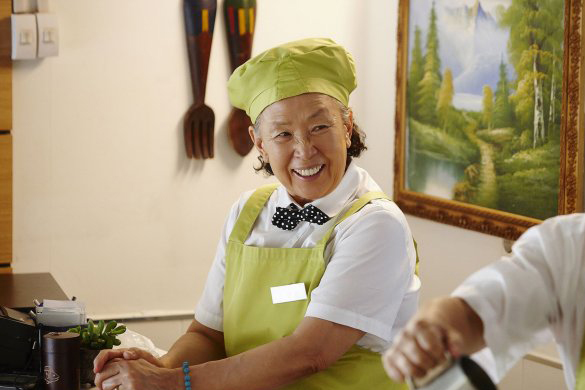"If you compare a woman to a ball, then a woman in her teens is a basketball. To get the ball high up in the air every man reaches for it as hard as he can... A woman in her 20s is like a rugby ball. Several men attack the ball like dogs to get possession of it. This is the only time a man will ever risk his life for a ball... A woman in her 30s is a ping-pong ball. The number of men going after the ball is significantly reduced but the attention paid is still decent... A middle-aged woman is a golf ball. There's only one man for each ball and he continually tries to send it as far away as he can... And beyond that, she's a dodgeball."
Synopsis:
74-year-old Mal-soon (Na Moon-hee) has had a difficult life; a fact she is not only happy to share with anyone who cares to listen but which she also actively goes out of her way to reference repeatedly, regardless of either the subject being discussed or the person she is speaking to (or, more accurately, talking at). Though her outspoken, forthright nature helped her in her younger days to cope with the struggles and sacrifices required to raise her son Hyun-chul (Sung Dong-il) following the death of her husband, over the years Mal-soon's feistiness has largely become argumentative beligerism to the extent that her endless interference in her son's family life has made her daughter-in-law (Hwang Jung-min) seriously medically ill.
On overhearing a conversation in which her family discusses putting her in an old people's home (supposedly temporarily), Mal-soon fears she has become nothing but a burden to those around her and on passing a photo studio called 'Forever Young' she decides the time has come to have her memorial picture taken, in what she's convinced are her final days. Sitting for the portrait to be taken, Mal-soon is told by the photographer that he'll make her look 50 years younger - a compliment she happily accepts - but to her shock, horror (and subsequent excitement) on leaving the studio she finds that physically she does now indeed look like her 24-year-old younger self (played by Shim Eun-kyung).
Deciding to go by the name Oh Doh-ri in homage to her favourite actress, Audrey Hepburn, it slowly begins to dawn on Mal-soon that perhaps this is a chance to live her life again and focus on all the dreams she was forced to sacrifice all those years ago but, as she is soon to rediscover, being young isn't all that easy, especially as her mind (and speech) are still of a rather bitter and fairly twisted 74-year-old...
Review:
Those who sit down to watch a 'suddenly young again' drama/comedy - of which there have been many of varying quality from numerous countries over the years (certainly in the West, at least, often used as vehicles for flagging or, alternatively, burgeoning acting careers; 'Freaky Friday', 'Peggy Sue Got Married', '17 Again', etc etc etc) - will likely expect and perhaps even hope for fairly light-hearted entertainment wrapped around an uplifting, life affirming message; with any commentary (if it even appears) used more for comedy and parody than societal critique or dissection.
While the narrative of 'Miss Granny' certainly remains light (to my mind a deliberate move, confidently realised) and warmly funny enough to enable the film to stand alongside the very best examples of such stories, however, it specifically Korean nature and character idiosyncrasies also speak of story aspects so prevalent in Korean films over the years that they (in terms of 'classic' Korean cinema, at least) became known as almost a comedy sub-genre in their own right: 'Fish out of water' comedies.
Whether you consider Song Kang-ho as the mild-mannered bank clerk taking up pro-wrestling in 'The Foul King'; look at the female gangster pushed to marry and settle down in 'My Wife is a Gangster'; or reference the gangsters hiding out in a monastery of 'Hi Darma' (the latter examples obviously also forming part of the 'gangster comedy' genre) since as far back as the New Korean Cinema wave of the late nineties and early noughties the repeated taking of characters from their normal, expected routines to place them in wacky situations far removed from their comfort zones gradually led to the coining of the term 'fish out of water' comedies and while such tales were of course also seen in other countries' cinematic output (a number of the US examples over the years being in fact based on their Korean counterparts), in Korea they played a far greater part than most in subtly underlining the changing face of society itself through both its modernisation and Westernisation as well as repeatedly referencing the gradual shift in male/female balance - again the commentary largely used to parody more serious cinematic output and use society itself as the basis for topical humour. As such, in taking the mind of a forthright and deeply opinionated older woman and placing it in the (physical) body of a 24-year-old girl, 'Miss Granny' perfectly stands as the latest example of a classic Korean 'fish out of water' comedy, but that really is only part of its homage (if you will) to cinematic lineage. For, the genuine, often laugh out loud humour generated by this well crafted and realised narrative move also screams of one of the most influential Korean comedies of all time; 'My Sassy Girl':
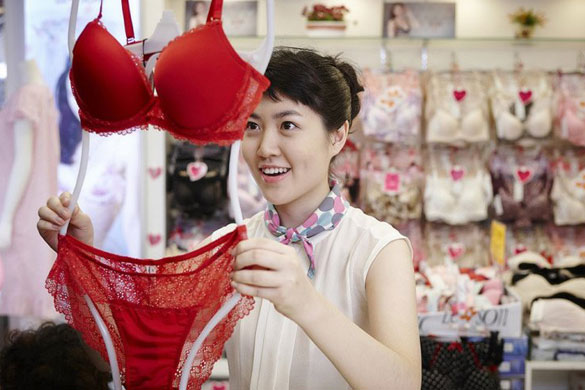 |
In 2001, Kwak Jae-young's deeply funny, moving and groundbreaking 'My Sassy Girl' went a fair way towards redefining depictions of women, relationships and love not only in Korean romantic comedy specifically but also Korean cinema as a whole. However, a significant part of the humour itself came from the unnamed heroine's loud, regularly abusive, vocal outbursts (the polar opposite of how society expected young women to behave) to the extent that almost every one of her overly frank statements appeared as shockingly funny, from a viewer point of view. In a similar way, 'Miss Granny' takes outspoken dialogue that would largely be tolerated from the elderly - who have in effect earned the right to say whatever they want, whenever they want and to whomever they want - and places it in the mouth of a character who outwardly appears to be of the younger generation, creating a comparable shock value in the characters around her.
Not only that, but 'Miss Granny' also takes account of societal attitudes to etiquette having greatly changed over the years and deftly points to that fact by making a number of the younger male characters fall in love with Mal-soon as a direct result of her coarse, abusive and uninhibited outspokenness. Add in the ongoing relationship between our physically young/mentally old heroine and a widower in his twilight years and that character 'shock value' is increased tenfold in tandem with the resultant humour, without ever overstepping the film's warm and light-hearted entertainment raison d’être.
Throughout 'Miss Granny', Mal-soon (regardless of whether she is her older or physically younger self) repeatedly asserts the importance of her past sacrifices to the success of her son and the happiness of her family, often feeling (from an outside perspective) as much of an effort to convince herself as make her family realise her undertaking was worth the difficulties caused, and her present day indulgence in a singing career as the front-person of her grandson's band - which she had to forfeit in her (original) youth - serves to allow Mal-soon to compare what was with what could have been in her life and gradually come to understand what is truly important to her.
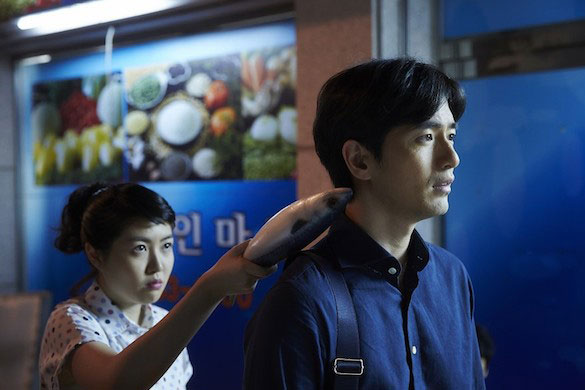 |
And speaking of Mal-soon's grandson's music group, though certainly not the strongest element of 'Miss Granny' it does nonetheless work well. Clearly, partly an effort to attract both younger and older viewers (and even unite them) in its depiction of a Kiss-like glam metal band who become pop stars (to a degree) playing songs that feel contemporary with a traditional tint and lyrics, it greatly underlines the 'light-hearted entertainment' element of the film in a fairly amusing (and even somewhat cheesy way) as well as, as already mentioned, serving as one side of Mal-soon's cathartic character arc. Mind you, whether any diehard heavy metal fans would be able to accept the ease (and speed) with which the group switches from loud, amp distorted rock and garish make-up (again reminiscent of glam metal band Kiss) to strummed melodies within a wholesome, family friendly and wholly pretty ensemble is another question entirely.
All in all, 'Miss Granny' uses an intelligent script and well written dialogue to ensure it successfully stands as quality Korean comedy at its very best and though a film such as this is first and foremost light-hearted (and indeed light) entertainment, it also successfully makes a point of subtly asking "If you were given the chance to change the things you have (or haven't) done in your life, would you?" And that's a question that ultimately bears thinking about for each and every one of us.
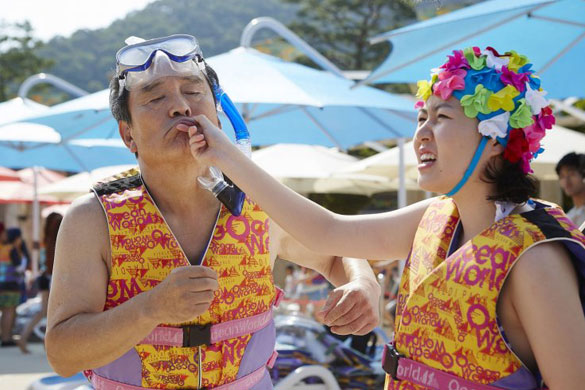 |
As a final point on the idea of Korean film lineage, to my mind the detailing of the gradual understanding Mal-soon's family come to have of both her life and the sacrifices she made for them follow a similar vein to that found in a number of - again classic, though more serious - Korean films over the years and even though the time slip elements of, for example, 'My Mother the Mermaid' or even the dual timeline of 'The Classic' are not specifically present in 'Miss Granny', it could be said that this elderly lady (a woman of the past) finding herself as a young woman of today is indeed just such a time shift, at least in a manner of speaking; certainly enough to bring both the aforementioned films to my mind during the final, somewhat more serious and melodramatic segments of Hwang Dong-hyeok's accomplished comedy.
Of course, in a film such as this, the believability that a character is really who they claim to be is utterly vital to its success and though the entire movie cast in this case give accomplished performances throughout, Shim Eun-kyung (as 24-year-old Mal-soon/Oh Doh-ri) absolutely owns 'Miss Granny' from the first frame in which she appears to the very last. So accomplished and pitch perfect is Shim Eun-kyung's portrayal as an old woman in a young woman's body (as difficult and seemingly impossible a portrayal to give credibility to as almost any you could mention) that viewers will easily come to accept the premise without doubt or questions. In fact, if you were to sit down and watch specific scenes in which 24-year-old Mal-soon repeats vocal statements and facial expressions made earlier by her 74-year-old counterpart/self you could almost start to believe that there is a familial relationship between actresses Shim Eun-kyung and Na Moon-hee.
From her first roles in films as a child actor, Shim Eun-kyung has repeatedly shown herself to be an actress of exemplary burgeoning talent and her performance in 'Miss Granny' quite simply shows her continuing career powering from strength to strength to strength.
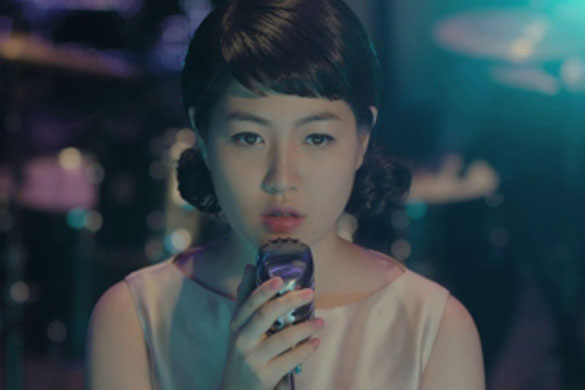 |
Summary:
While 'Miss Granny' is wholly light-hearted (and indeed light) entertainment at its core, it nonetheless contains aspects utterly inherent to classic Korean comedies over the years and elements that speak of a number of hugely influential films; all adding up to an intelligently written, genuinely funny film that stands as an example of quality Korean comedy at its very best.
'Miss Granny' (수상한 그녀) / 2014
Directed by: Hwang Dong-hyeok
Starring: Shim Eun-kyung, Na Moon-hee, Park In-hwan, Sung Dong-il
|


